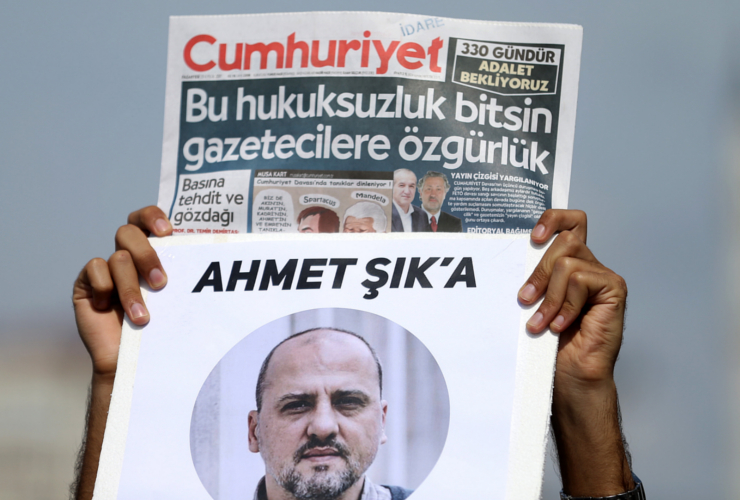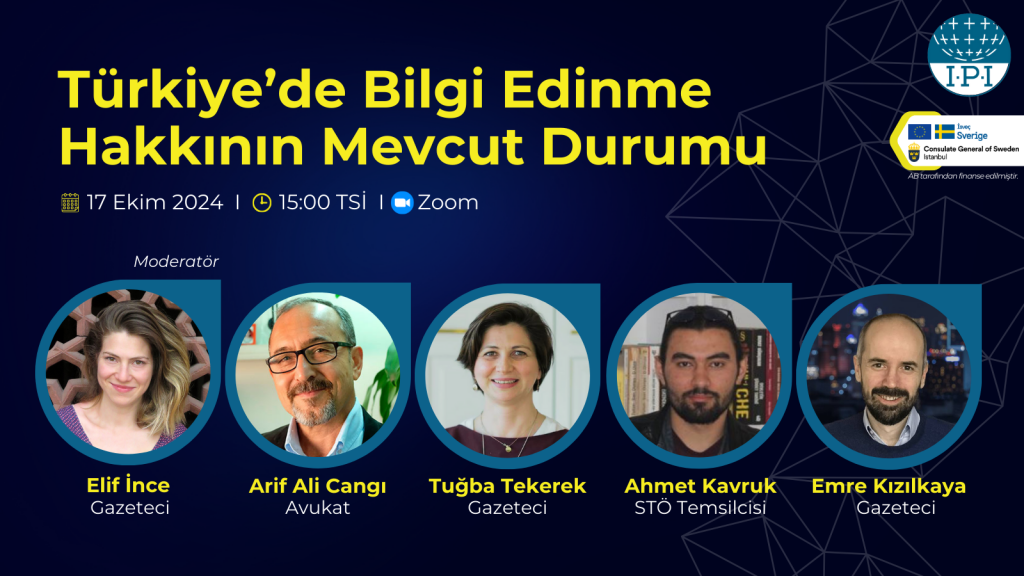On Friday, March 9, International Press Institute (IPI) observers will attend the sixth hearing of the trial against journalists with Turkey’s Cumhuriyet newspaper in Istanbul.
While several defendants in the case were previously released on bail, investigative journalist Ahmet Şık and Editor-in-Chief Murat Sabuncu – both IPI members – remain in pre-trial detention on charges of “aiding a terrorist organization while not being a member of said organization” and employment-related “abuse of trust”.
Şık has now been behind bars for 432 days, accused of being a supporter of both the outlawed Kurdistan Workers’ Party (PKK) and the movement led by the exiled cleric Fethullah Gülen, whom the Turkish government blames for the 2016 coup attempt.
Authorities detained Şık, one of the AKP regime’s most prominent critics, on December 29, 2016, for allegedly spreading terrorist propaganda in several tweets, articles and interviews. Among the articles cited were stories critical of Turkey’s handling of the conflict with the PKK and interviews with senior members of the PKK and the Revolutionary People’s Liberation Party/Front (DKHP/C).
This is not the first time Şık has been imprisoned with the intention of silencing his voice of informed dissent. He was previously detained in March 2011 as part of the inquiry into the alleged “Ergenekon” coup plot. Authorities accused Şık of aiding the plot through his book “The Imam’s Army”, which detailed Gülen’s reorganization of the security services in Turkey. (Şık’s long-time criticism of the Gülen movement makes the current charges especially ironic.)
In a speech at the Council of Europe in 2011, then-Prime Minister Recep Tayyip Erdoğan, at the time allied with Gülen, compared Şık’s book to a bomb, commenting, “It is a crime to use a bomb, but it is also a crime to use materials from which a bomb is made.”
Upon his release on bail just over a year later, on March 12, 2012, Şık stated: “Justice has failed. The law and democracy cannot bring it back. In my case alone five people were locked up and 100 journalists remain behind bars. Freedom of speech is not solely a journalist’s problem. There are around six hundred students (in detention). We will continue with this struggle.”
“Ahmet Şık, one of Turkey’s most effective investigative journalists, has been held in solitary confinement for nearly 450 days simply for carrying out his profession”, IPI Turkey Advocacy Coordinator Caroline Stockford said.
“The reasons cited for pretrial detention in Turkey are that a defendant might ‘tamper with evidence’ or ‘abscond’. As IPI has often reiterated, the alleged ‘evidence’ against Şık consists of social media posts and articles he wrote for Cumhuriyet. Neither type of ‘evidence’ can be tampered with, and a travel ban following release on bail would prevent Şık from leaving the country. There is no justification for Şık’s continued detention and we urge the court to free him and Murat Sabuncu this week.”
Pretrial detention impacts fairness of trial
Şık is one of thousands of prisoners in Turkey whose detention in solitary confinement for a period that can extend to years is both extremely damaging to their physical and psychological health and seriously undermines their right to both a speedy and effective legal remedy and presumption of innocence.
The European Court of Human Rights (ECtHR) is expected to deliver a verdict shortly in a case brought by journalists Mehmet Altan and Şahin Alpay that focuses on the issue of pre-trial detentions. IPI hopes that the EctHR will take a strong stance against the practice that can be used as precedent for other cases, including those of Şık and Sabuncu. It also calls again on European governments to pressure Turkey, an ally and important trading partner, to stop the practice.
In its 2015 report “Abuse of pretrial detention in States Parties to the European Convention on Human Rights”, the Council of Europe’s Committee on Legal Affairs and Human Rights called on member states to “implement specific measures aimed at reducing pretrial detention and stamping out its abuse” and stated:
• any interference with the right to liberty must be in strict conformity with the limitative list of permissible restrictions in Article 5 of the Convention;
• persons held in pretrial detention are presumed innocent and have the right to be treated as such; and
• the use or abuse of pretrial detention has a strong impact on the fairness of the trial, which is guaranteed by Article 6 of the Convention.
Turkey is consistently disregarding the European Convention in terms of Articles 5 and 6 by hiding behind the state of emergency, which allows it to suspend some of its obligations under the Convention.
State of emergency remains despite Venice Commission criticism
In an October 2017 opinion on Turkey’s Emergency Decree Law No. 674 concerning the exercise of local democracy in Turkey, the Venice Commission noted that “emergency powers have been abused by authoritarian governments to stay in power, to silence the opposition and to restrict human rights in general” and stated that “strict limits on the duration, circumstance and scope of such powers is therefore essential. State security and public safety can only be effectively secured in a democracy which fully respects the Rule of Law.”
More than 18 months after the attempted coup, Turkey continues to operate under emergency legislation, which it uses not only to unlawfully incarcerate opposition journalists but also to prevent civil society from functioning.
The prosecutor in the Cumhuriyet case is expected to announce a sentencing request on March 9. IPI once again urges diplomatic missions in Istanbul to attend the trial at Silivri Prison this Friday and to translate their shared values of the importance of free speech and the rule of law into effective pressure on the Turkish government to uphold its international obligations and free all imprisoned journalists, including Ahmet Şık and Murat Sabuncu.




